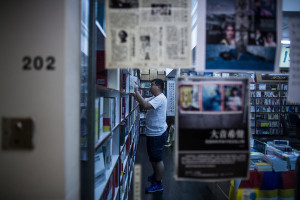 By MICHAEL FORSYTHE and CRYSTAL TSE October 21, 2015
By MICHAEL FORSYTHE and CRYSTAL TSE October 21, 2015
The 1908 book store, which specializes in banned Chinese language books, has seen business fall off substantially in part because mainland tour groups are told by their guides that they are not allowed to bring banned books and magazines home.
Lam Yik Fei for The New York Times
HONG KONG — The tiny book stall next to the popular Star Ferry terminal in Hong Kong does a brisk business catering to the thousands of visitors from mainland China who pass by every day.
About half of its books are political, including titles about the private lives, backroom politics and fabulous fortunes of the Communist Party elite in China. The other half are pornographic. Both types are banned in the mainland.
“Political books and pornography books both have market value,” said the owner, Mak Kuen-tat, as he leafed through a tabloid about local celebrity gossip.
But a few blocks away, a different calculus is at play. The Commercial Press bookstore does not carry the banned political books. Instead, the collected speeches of China’s president, Xi Jinping, are prominently displayed, as are at least four biographies of Lee Kuan Yew, the late Singaporean leader who was widely admired by Chinese officials.
It is the same pattern in 13 other Hong Kong stores owned by the parent company of Commercial Press, Sino United Publishing, the biggest bookseller and publisher in the city. Despite the interest from mainland tourists, books that paint Chinese politicians in a bad light are either not available or tucked out of sight on shelves far from heavily trafficked areas. As in the United States, pornography is not found in most bookstores.
According to Hong Kong corporate records and one of the company’s top executives, Sino United is owned, through a series of holding companies, by the Chinese government.
The company’s dominant position in the city’s publishing and bookselling industry is a major breach in the wall between the communist mainland and Hong Kong, a former British colony whose civil liberties — including freedom of the press — were guaranteed by treaty for half a century after it returned to Chinese sovereignty in 1997. It also illustrates how the central government in Beijing wields influence here not through force, but through its financial clout.
That influence has become even more apparent in the nearly three years since Xi became the top leader in China.
The traditionally rambunctious news media here faces growing pressure to soft-pedal coverage of Beijing and the Beijing-aligned Hong Kong government. Most of Hong Kong’s newspapers and television stations are independently owned, but often by pro-Beijing tycoons. In some cases, top editors who oversaw coverage critical of China have been shunted aside.
The two most vocally pro-Beijing newspapers, Ta Kung Pao and Wen Wei Po, are owned by the same government-owned holding company, Guangdong New Culture Development, that owns Sino United.
The market for books on Chinese politics, which have long been a fixture in Hong Kong bookstores that cater to mainland visitors, has fallen on hard times. Interviews with booksellers and publishers say that market forces — rising rents and the advent of e-books — play a part. But so does Xi’s government, which is increasingly intolerant of dissent and has warned Chinese tourists that they risk being punished if they return from Hong Kong or Taiwan with banned political books.
During Xi’s tenure, Sino United has curtailed its purchases of political books, said Bao Pu, publisher at New Century Press in Hong Kong, whose titles include the memoir of Zhao Ziyang, a former Chinese premier. Sales of New Century’s books to Sino United have fallen by 90 percent since Xi took office, Bao said in an interview.
That hurts in Hong Kong, with Sino United’s position controlling as much as 70 percent of the market, Bao said. Last year was the first he failed to make a profit in more than a decade in the publishing industry.
“It’s an existential threat,” he said, adding that he was looking to branch out into graphic novels. “At best we can break even.”
Elvin Lee, an assistant president at Sino United and the chairman of the Hong Kong Publishing Professionals Society, denies that political considerations play a role in the company’s decisions on which books to publish or sell.
“Business comes before any other concerns,” he said in an interview at Sino United’s Hong Kong headquarters, where the elevator lobby is festooned with pro-Beijing political posters. “Every brand gets to make their management decisions.”
The ultimate owner of Sino United is the Chinese Finance Ministry, Lee said. “But we make sure they are only a shareholder.”
One of the biggest publishers of banned political books in Hong Kong, Ho Pin, founder and chief executive of the Mirror Media Group, says the real problem is not the Chinese government, but self-censorship by Hong Kong’s news media elite as they cozy up to Beijing.
For detail please visit here
